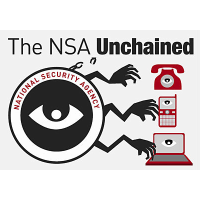Is the End of Section 215 of the Patriot Act Much Ado about Nothing? 7 Ways the NSA can Keep Spying
 (graphic: ACLU)
(graphic: ACLU)
Section 215 of the Patriot Act (pdf) may have expired due to Congress failing to reauthorize it, but what hasn’t expired is the U.S. government’s many other ways of spying on Americans.
The good news is that with the end of Section 215, the National Security Agency has lost its legal authority to collect the phone records of Americans in bulk.
As The New York Times’ Charlie Savage put it: “For the first time since the aftermath of the terrorist attacks of Sept. 11, 2001, Americans are again free to place phone calls — to friends, lovers, business associates, political groups, doctors and pizza restaurants — without having logs of those contacts vacuumed up in bulk by the National Security Agency.”
But what about all the scaremongering being dished out by a number of lawmakers, warning Americans that they are vulnerable to a terrorist attack without the protection of Section 215? In fact, the government has never provided a single instance of a terrorist plot being thwarted by that NSA tool.
The Privacy and Civil Liberties Oversight Board, after a review of classified documents, reported (pdf) that it “could not identify a single instance involving a threat to the United States in which the telephone records program made a concrete difference in the outcome of a counterterrorism investigation.”
“The President’s Review Group, which also reviewed classified files, determined that the call-records program had ‘not [been] essential to preventing attacks,’ and that, to the extent the program had contributed to terrorism investigations, the records in question ‘could readily have been obtained in a timely manner’ using targeted demands,’” reported Jameel Jaffer at Just Security.
Additionally, a new report (pdf) from the Justice Department’s Inspector General states that the FBI has been “unable to identify any major case developments that resulted from use of the records obtained through use of Section 215 orders.”
So is there anything at all behind the government’s dire warnings, and are Americans indeed free of NSA surveillance? Not by a long shot. Section 215 was “only one of a number of largely overlapping surveillance authorities, and the loss of the current version of the law will leave the government with a range of tools that is still incredibly powerful,” reported the Electronic Frontier Foundation (EFF). Likewise, the American Civil Liberties Union says the loss of 215 won’t impact the “government’s ability to conduct targeted investigations of terrorist threats.”
EFF provided many examples of how the government can still conduct authorized surveillance of individuals:
· Pen registers can be used to collect “dialing, routing, addressing, or signaling information” including telephone numbers dialed and Internet metadata such as IP addresses and email headers. Two pen register statutes exist, one that covers foreign intelligence surveillance and the other for law enforcement. The law requires that they only be used in criminal or national security investigations.
· The pre-Patriot Act Business Records Provision, still in effect under the Foreign Intelligence Surveillance Act (pdf), allows the government to obtain business records from transportation carriers and storage facilities.
· National Security Letters function similarly to subpoenas, allowing intelligence and law enforcement agencies to collect records from a range of entities including credit reporting bureaus, financial institutions, travel agencies and telecommunications providers.
· FISA warrants issued by the Foreign Intelligence Surveillance Court permit the government to engage in both physical searches and electronic surveillance, provided they are performed in the context of national security investigations.
· Subpoenas and court orders can be issued through federal agencies, grand juries, and “D” orders via Section 2703(d) of the Electronic Communications Privacy Act (pdf). With a “D” order, the government can obtain data “from ISPs or other communications providers about their customers, including the sorts of metadata the government gets with Section 215,” according to EFF.
-Danny Biederman, Noel Brinkerhoff
To Learn More:
Don’t Worry, the Government Still Has Plenty of Surveillance Power If Section 215 Sunsets (by Cindy Cohn and Andrew Crocker, Electronic Frontier Foundation)
Scaremongering about the Patriot Act Sunset (by Jameel Jaffer, Just Security)
A Gap in Surveillance, but Ways Around It (by Charlie Savage, New York Times)
Senate Effort to Renew NSA Spying Powers Contains Provision to Stop Next Edward Snowden (by Kevin Gosztola, FireDogLake)
Federal Appeals Court Rejects Mass Surveillance by Bush and Obama Administrations (by Noel Brinkerhoff, AllGov)
NSA Bulk Surveillance Could Continue even if Legal Authority Expires on June 1 (by Noel Brinkerhoff, AllGov)
NSA Phone Data Collection Made No Difference to National Security (by Noel Brinkerhoff and Danny Biederman, AllGov)
FBI’s Use of Patriot Act to Secretly Obtain Americans’ Business Records Increased by 1,000% Under Obama (by Noel Brinkerhoff and Danny Biederman, AllGov)
- Top Stories
- Unusual News
- Where is the Money Going?
- Controversies
- U.S. and the World
- Appointments and Resignations
- Latest News
- Trump to Stop Deportations If…
- Trump Denounces World Series
- What If China Invaded the United States?
- Donald Trump Has a Mental Health Problem and It Has a Name
- Trump Goes on Renaming Frenzy






Comments